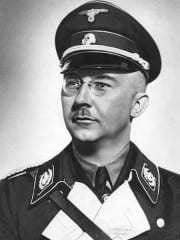Craig Smith
Otto Rahn's Crusade Against the Grail
William Henry talks to Christopher Jones, who has translated one of the legendary ?hidden? books of our time, Otto Rahn's Crusade Against the Grail. Although Rahn wrote in 1933, it has taken 73 years for it to be published in English. Find out why, then listen to possible Sasquatch cries thanks to the intrepid Linda Moulton Howe!
Himmler and Otto Rahn's Cathars
Once a faithful Roman Catholic, Heinrich Himmler rejected religion at about the time that a parliamentary decree robbed him of his aristocratic title. Stripped of both his faith and social status simultaneously, Himmler, like the fictional Dieter Bachman of The Blood Lance, threw himself passionately into the Nazi cause. At the same time he became interested in all aspects of the occult.
Himmler does not seem to have been an especially brilliant man but he was educated, sophisticated, and notoriously energetic. As the leader of the SS, he oversaw the activities of the Gestapo; he ran the concentration camps; he provided Hitler ultimately with twelve divisions of elite armoured troops, and he built a massive civilian organisation devoted to German culture. It oversimplifies matters to suggest the SS was Hitler's Praetorian Guard, with Himmler in the role of Tiberius' Prefect, Aelius Sejanus. Likewise, it misses much of the complexity of the SS to say they are like the Knights Templar of the Crusade era. The similarities between the two organisations are probably not accidental, but it was the civilian side of the SS that made the Order of the Skull Himmler's own creation. It was into the civilian branch of the SS that Himmler recruited Otto Rahn.
Otto Rahn in Wikipedia
Otto Wilhelm Rahn (February 18, 1904—March 13, 1939) was a German medievalist and a Obersturmführer (First Lieutenant) of the SS, born in Michelstadt, Germany.
Speculation still swirls around Otto Rahn and his research. From an early age, he became interested in the legends of Parsifal, Holy Grail, Lohengrin, and the Nibelungenlied. While attending the University of Giessen he was inspired by his professor, the Baron von Gall, to study the Albigensian (Catharism) movement, and the massacre that occurred at Montségur. Rahn is quoted as saying that "It was a subject that completely captivated me''".
Work



Neueste Kommentare
vor 13 Jahre 50 Wochen
vor 13 Jahre 50 Wochen
vor 13 Jahre 50 Wochen
vor 13 Jahre 51 Wochen
vor 14 Jahre 2 Wochen
vor 14 Jahre 7 Wochen